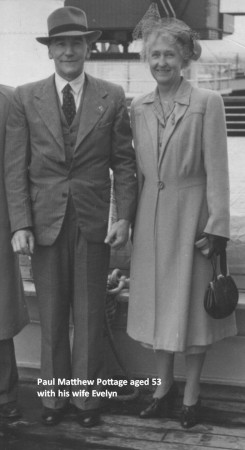WWI Stories – Paul Matthew Pottage
Harrow
Ellis Pottage son, and Paul Pottage grandson, share the story of Paul Matthew Pottage who served on Gallipoli and the Western Front.
 Paul Matthew was born on 1 October 1895 at Harrow Victoria and enlisted at Albert Park Melbourne on 17 August 1914 with the rank of Driver in the artillery. He was on the first convoy and arrived at Port Said on 2 December 1914 and was moved by train to Cairo to Mena Camp by the Pyramids. Paul Matthew was in the ANZAC landing which began before dawn on Sunday 25 April 1915 and at 5.30 pm that day was in the party which landed the first gun, an 18-pounder of the 4th Battery, which was placed on a knoll at the southern end of the Beach. Artillery action was very restricted on Gallipoli and in the fighting Paul Matthew joined the infantry in close quarter attacks and a bayonet charge using a dead soldier’s rifle. Paul Matthew became ill with Pleuradina and was returned to Australia for hospital treatment. In Melbourne in the next bed to Paul was Ellis Stones, later renowned landscape gardener, and it was here that Paul met Ellis’s sister Evelyn who later became his wife. Paul recovered and returned to service, disembarking at Marseilles in June 1916. He then served in the 5th Division, 13th Field Artillery Brigade, 51st Battery until the end of the war.
Paul Matthew was born on 1 October 1895 at Harrow Victoria and enlisted at Albert Park Melbourne on 17 August 1914 with the rank of Driver in the artillery. He was on the first convoy and arrived at Port Said on 2 December 1914 and was moved by train to Cairo to Mena Camp by the Pyramids. Paul Matthew was in the ANZAC landing which began before dawn on Sunday 25 April 1915 and at 5.30 pm that day was in the party which landed the first gun, an 18-pounder of the 4th Battery, which was placed on a knoll at the southern end of the Beach. Artillery action was very restricted on Gallipoli and in the fighting Paul Matthew joined the infantry in close quarter attacks and a bayonet charge using a dead soldier’s rifle. Paul Matthew became ill with Pleuradina and was returned to Australia for hospital treatment. In Melbourne in the next bed to Paul was Ellis Stones, later renowned landscape gardener, and it was here that Paul met Ellis’s sister Evelyn who later became his wife. Paul recovered and returned to service, disembarking at Marseilles in June 1916. He then served in the 5th Division, 13th Field Artillery Brigade, 51st Battery until the end of the war.
Paul took part in the battle of Fromelles, 19 July 1916, and an extract from his diary reads “I was one of the burying party for the men who were killed yesterday. It was the worst job ever I had as they were all shattered and we had a hard job to get them together.”
Paul was promoted to Sergeant on 18 March 1917 when facing the Germans at the Hindenburg Line. He was awarded the Military Medal for his action on the night of 13/14 August 1917 near Ypres. On 24 April 1918 in the fighting for Villers Bretonneux, Paul won a Bar to his Military Medal and was awarded the French Croix de Guerre. Extract from the Citation reads :- “This N.C.O. was in charge of his gun which was in action at 3.45 a.m. on the morning of 24th April 1918 N.E. of CORBIE, and which at this time was subjected to a heavy H.E. and Gas shell bombardment accurately placed on his Section. He kept his gun in action and shewed great coolness and commanded his detachment in a very efficient manner. Later, when his gun was ordered to be withdrawn he again shewed a thorough appreciation of the situation, remained perfectly cool and by his personal efforts was largely instrumental in getting his gun, team and personnel away from the heavily shelled position.” The counterattack to retake Villers Bretonneux was successful and by 10.30 a.m. on 25 April 1918 it was in Allied hands.
 Paul was in the Battle of Amiens, the major Allied offensive on 8 August 1918, using General Monash’s visionary plan of major fighting done by artillery, tanks, armoured cars and aeroplanes making a lightning strike. The advance was successful and the Australian objective of Harbonnières was taken by 11am and the Australian flag flew from the church spire. Paul greatly admired General Monash. Paul remained in France until April 1919, then in England until May 1919 when he embarked on the “Orontes” and arrived in Melbourne on 28 June 1919 and discharged. He married Evelyn Stones on 19 October 1921. He was an intelligent and kind person and with his wife of similar qualities they had a happy family life with two children. His occupation was a Customs Officer in Melbourne. Paul Matthew Pottage died in 1966 aged 70. His full story is told in the book “Willaura’s Finest” by T.Munro and G.Hosken published 2013 by Willaura and District Historical Society.
Paul was in the Battle of Amiens, the major Allied offensive on 8 August 1918, using General Monash’s visionary plan of major fighting done by artillery, tanks, armoured cars and aeroplanes making a lightning strike. The advance was successful and the Australian objective of Harbonnières was taken by 11am and the Australian flag flew from the church spire. Paul greatly admired General Monash. Paul remained in France until April 1919, then in England until May 1919 when he embarked on the “Orontes” and arrived in Melbourne on 28 June 1919 and discharged. He married Evelyn Stones on 19 October 1921. He was an intelligent and kind person and with his wife of similar qualities they had a happy family life with two children. His occupation was a Customs Officer in Melbourne. Paul Matthew Pottage died in 1966 aged 70. His full story is told in the book “Willaura’s Finest” by T.Munro and G.Hosken published 2013 by Willaura and District Historical Society.
The Anzac Centenary evokes thoughts of loss and suffering, of all the young women who did not marry because so many fine young Australians did not return, and of the suffering of those who survived but with debilitating wounds.





